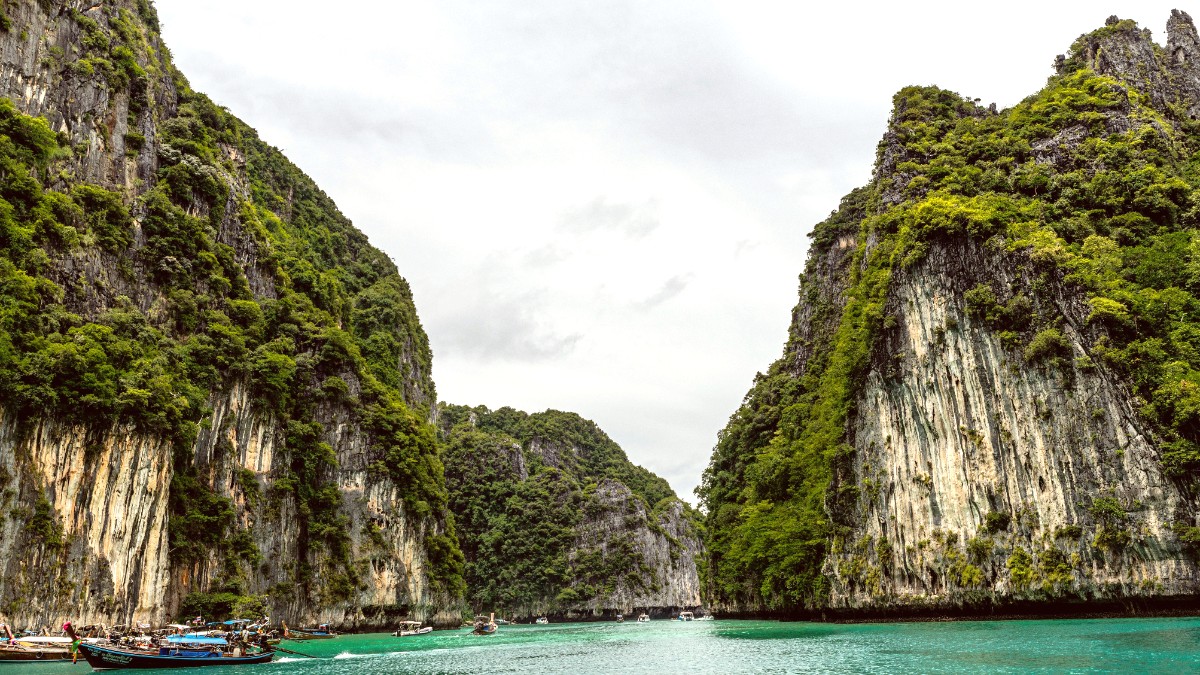
Andaman Coast, Thailand
Khao Lak, on the Andaman Coast, experiences a tropical monsoon climate with three main seasons:
Hot Season (March - May): Temperatures range from 30-36°C (86-97°F). Humidity remains high. As May approaches, afternoon thunderstorms become more frequent. The sea remains calm, but the heat can be intense.
Wet/Monsoon Season (May - October): Temperatures average 25-32°C (77-90°F). Humidity levels are consistently high. Frequent, heavy, but often short rain showers, interspersed with sunshine. Sea conditions can be rough.
Cool/Dry Season (November - February): Most popular time to visit. Temperatures average a comfortable 22-30°C (72-86°F). Lower humidity, abundant sunshine. Seas are generally calm and clear, ideal for water activities.
Diving and Snorkeling (Similan & Surin Islands): November to April conditions are best, with calm seas and clear visibility. These parks typically close outside this window.
Beach Relaxation: November to February provides ideal weather for beaches, with abundant sunshine and comfortable temperatures.
Waterfall Visits (e.g., Lampi, Chong Fah): Most impressive during or just after the rainy season, from June to November. Increased water flow makes them truly spectacular.
Surfing: The monsoon season, May to October, brings waves to specific beaches like Pakarang Cape. Surf schools operate during this time.
Intense rain showers are part of the low season. Tropical storms can occur, bringing strong winds and heavy rainfall.
Dry season for clear waters and open parks.
Wet season due to frequent rain and rough seas.
March to May can feel intensely hot and humid. Hydration and sun protection are important.
Wet season for fullest waterfalls.
Consider heat in March-May.
Choose your travel dates based on your priority. For diving, the dry season. For quiet, budget-friendly trips, the wet season is an option.
Monsoon season for surfing waves.
Low season has fewer tour options.
Perfect beach weather and island excursions, abundant sunshine, calm, clear seas. All tour services operate fully, and most businesses open.
Lowest prices for accommodation and tours, often with considerable discounts. Minimal tourist crowds. Landscapes lush and green. Frequent heavy rain and rough seas. Similan and Surin Islands National Parks typically close. Limited tour options, some smaller businesses may close.
Best for diving and snorkeling to Similan & Surin Islands.
Ideal for general beach relaxation.
Waterfalls (Lampi, Chong Fah) are at their most impressive.
Surfing at specific beaches like Pakarang Cape.
Shoulder season with fewer crowds, rising temperatures.
Requirements vary by nationality and intended length of stay.
Many countries' citizens (USA, UK, Canada, Australia, most EU nations) enter Thailand without a visa for tourism. This exemption permits stays of up to 30 days for air arrivals. Land arrivals have permitted stays of 15 or 30 days. This period often extends at an immigration office in Thailand.
Specific documents for entry are important, regardless of visa status.
The official currency is the Thai Baht (THB). Major international currencies readily exchange at banks, licensed exchange booths, and some hotels. ATMs are widely available. Local exchange booths often provide better rates than banks or airport counters.
Be ready for common concerns and know how to get help.
Traveler's Diarrhea: Drink only bottled water, avoid questionable ice, and eat hot, freshly cooked food. Peel fruits yourself.
Mosquito-borne illnesses (Dengue, Malaria): Dengue fever is present. Malaria risk is low in tourist zones. Insect repellent with DEET or picaridin, long sleeves/pants at dawn/dusk, and mosquito nets are protective measures.
No vaccinations are typically required for entry unless from a yellow fever endemic country. Consult your doctor or a travel clinic for recommended vaccinations.
Routine vaccinations: MMR, DTP, Varicella, Polio, Flu shot.
Rabies/Japanese Encephalitis: For long stays/remote areas.
Khao Lak has clinics and small hospitals (Khao Lak International Clinic, Takua Pa Hospital). Pharmacies are widely available. Serious emergencies may transfer to larger hospitals in Phuket or Krabi.
Khao Lak International Clinic caters to tourists.
Complex conditions may require transfer to Phuket/Krabi.
Tap water is not safe to drink. Always use bottled water. Prioritize food from popular, busy stalls or restaurants with high customer turnover.
Bottled water for drinking and brushing teeth.
Avoid raw or undercooked dishes from unknown sources.
| Category | Details | Prevention/Response |
|---|---|---|
| Crime | Generally very safe with low crime rates. Petty theft (pickpocketing, bag snatching) in crowded areas. | Keep valuables out of sight, do not flash cash, be aware of surroundings, especially at night or after consuming alcohol. Pacsafe for anti-theft bags. |
| Natural Disasters | Tsunami (rare but possible, warning systems in place). Localized flooding during heavy monsoon. Rough seas during monsoon. | Familiarize yourself with tsunami warning systems/evacuation routes. Adhere to warnings from local authorities; pay attention to red flags on beaches. |
| Emergency Contacts | Tourist Police: 1155. Emergency (General Police/Fire/Ambulance): 191. Ambulance/Medical: 1669. Fire: 199. | Save numbers to your phone. Remain calm, provide clear information. Adventure Medical Kits for first aid. LifeStraw for water safety. |